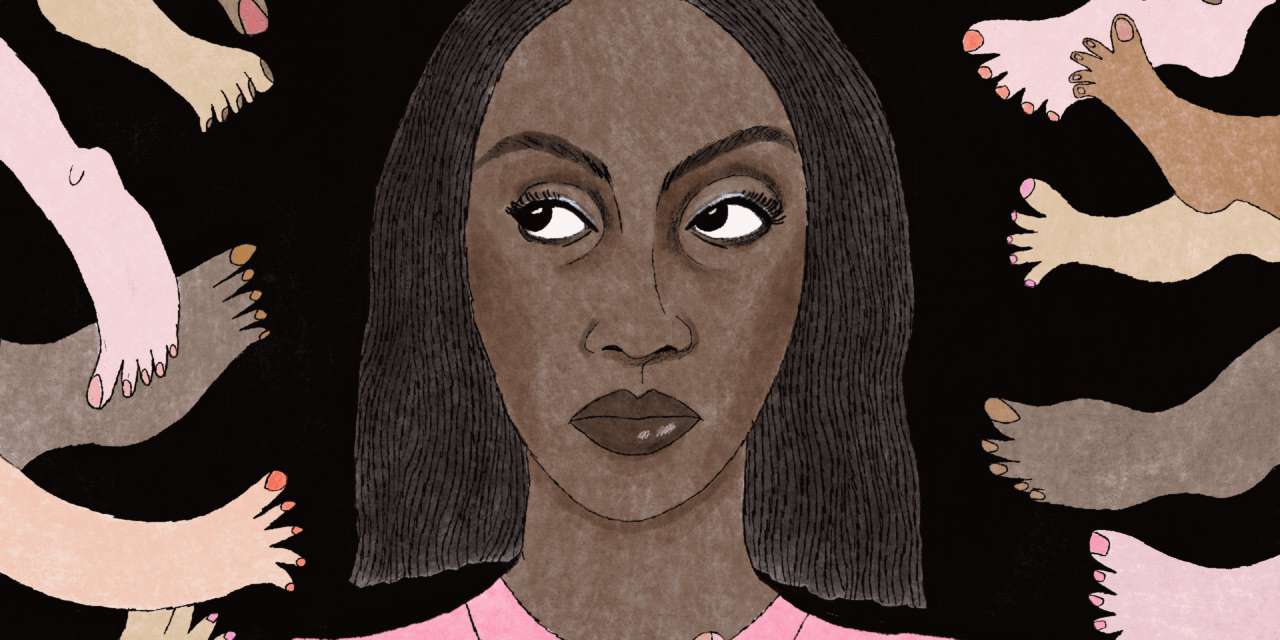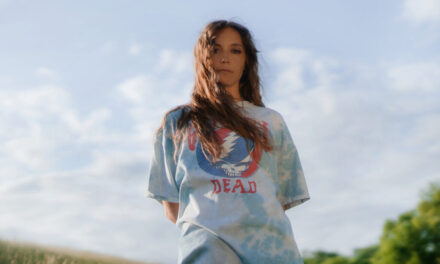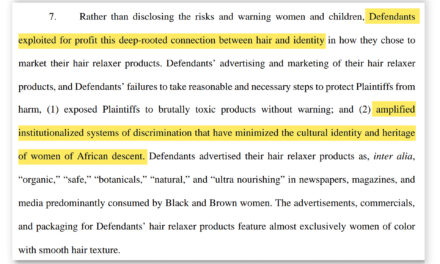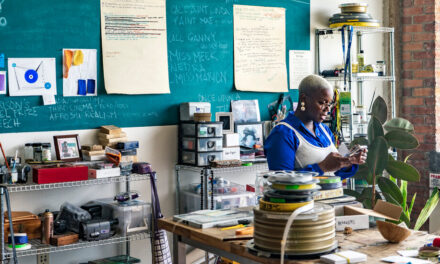Best Foot Forward
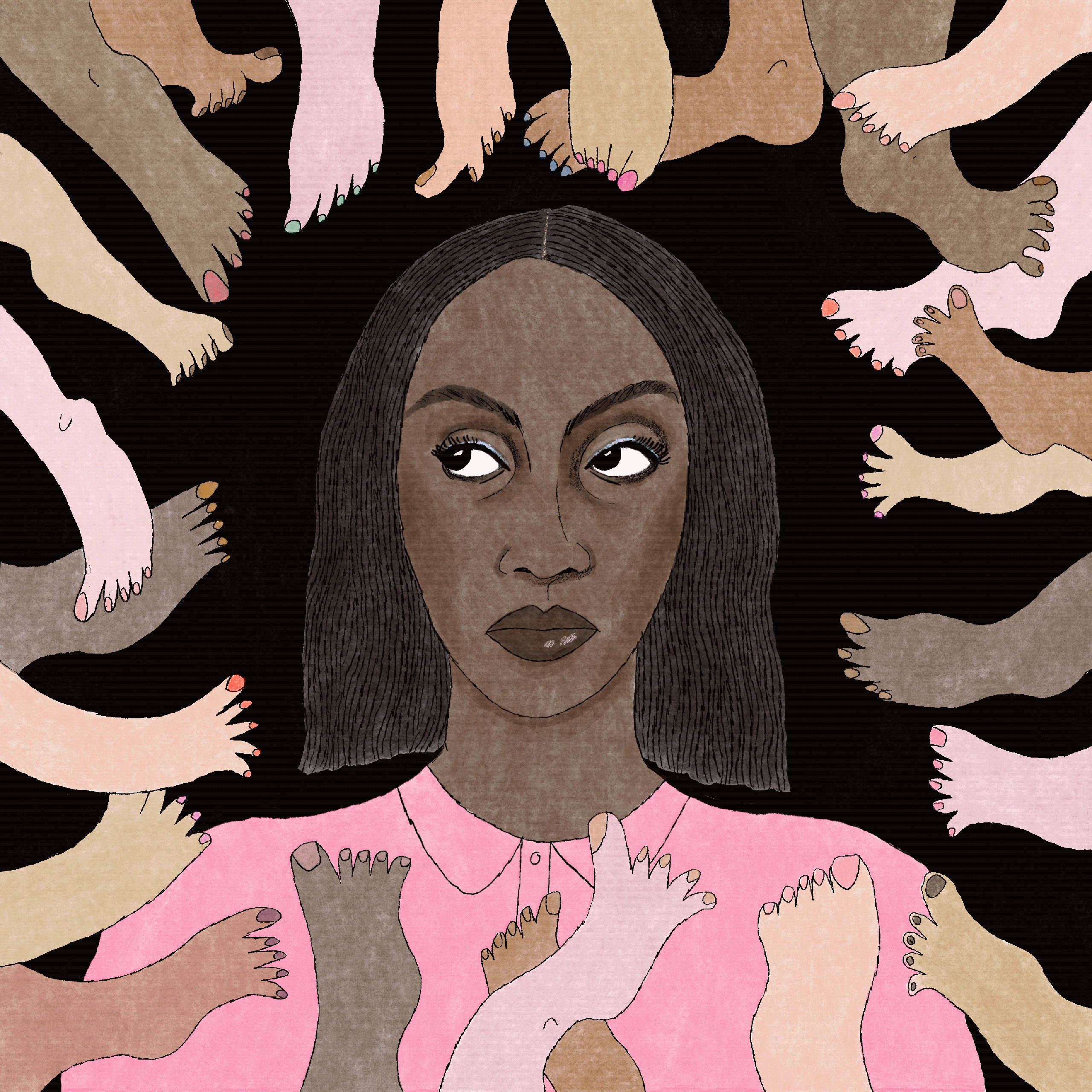
Unfortunately, I am on wikiFeet. For those who do not know, wikiFeet is a photo-sharing foot-fetish site dedicated to celebrities’ feet. I found out that I was on it in 2019, at a time when I would not have described myself as a celebrity. A friend forwarded my rating to me, insisting that I had “made it.” The idea that anyone would invest time and energy ogling my feet was beyond my comprehension, but it was true—I was featured on a Web site that averaged more than ten million visitors a month.
I do not judge the sexual proclivities of members of the wikiFeet community. But, personally, my sexual proclivity is that no one look at my feet, ever. To my horror, I learned that I had a wikiFeet rating of two stars, categorized as “okay feet.” While “okay” is technically not an insult, it is not a compliment, either. I hate my feet. Also, I hate everyone else’s feet. In my humble opinion, feet are just ugly hands, and hands are not that cute to begin with. But, though it’s fine for me to have disdain for my extremities, for strangers to rate my ten toes as anything other than “perfect,” “beautiful,” or possibly “dainty” is a hate crime that should be punished to the fullest extent of the law. This may seem like an irrational reaction, but you are wrong and stupid, and also, shut up!
I am very self-conscious about the way that I look, in part because I am a woman who happens to be conscious. Since birth, every piece of media I have encountered has socialized me to hate all of my body parts. It didn’t help that I was an ugly duckling. As a kid, my hair, which my mother insisted that I chemically straighten, was dry and brittle. Every six to eight weeks, she would slather my head in Just for Me No-Lye Conditioning Crème Relaxer, which burned my scalp. Where my natural hair would leave combs broken in its wake—there is a reason Lil Wayne rapped “tougher than Nigerian hair” in “A Milli”—my relaxed hair would break if a breeze hit it wrong. Worst of all, my hair looked nothing like that of the beaming child on the box, which makes sense—according to a recently trending topic on Twitter, the kids on the boxes did not use the product. When I used it, my hair became too flat and delicate to support hats, which might have been the best remedy for my shame.
I had severe eczema. The skin above my upper lip had darkened with scarring from a bad habit of nervously licking my lips. I looked like I had a Steve Harvey mustache that was impossible to shave. I also had discolored rings around my eyes. Years later, this discoloration would make it appear as if I always had on wispy eyeshadow, but at twelve years old I resembled King Julien, the lemur in “Madagascar.”
I had body odor. As an adult, I am known for smelling as fresh as a tropical beach after a rainstorm, because I surround myself with candles and fragrances. However, when I was a child, I was unfamiliar with the concept of deodorant. For some reason, it had never been explained to me. Not to point any fingers, but my mother refused to buy me products that acknowledged that I had hit puberty, and instead told me to scrub my armpits harder. One issue for a stinky middle schooler is that people will actually remark on your scent. The most memorable conversation about my stinkiness was when my sixth-grade teacher, Mr. [REDACTED], pulled me aside during gym class to ask me if my parents were dead. Confused, but ever cheery, I informed him that they were not. He replied, “Well, then, tell your mother to buy you deodorant.”
I guess that, in Mr. [REDACTED]’s reality, the only logical explanation for my body odor was that I was an orphan whose parents’ death in some freak accident had led to my subsequent neglect. I’m not sure that I would subject an eleven-year-old to such direct questioning about emotional trauma, but public schools are underfunded and sometimes you get what you pay for. Months later, I would get back at Mr. [REDACTED] by constantly reminding the class that he owed us a pizza party that he’d promised us if we had perfect attendance for a week, which, as an underpaid teacher, he probably couldn’t afford—my bad.
I had other insecurities. For example, my clothes. When my mother was not trying to put me in traditional geles (Nigerian head wraps), I wore high-water pants from Marshalls and unlicensed graphic tees featuring not-Disney characters that were just slightly off (e.g., “101 Dalmatians” sweatshirts where the dogs were missing their signature spots). When Nelly’s “Air Force Ones” ran up the Billboard charts, I did not have designer sneakers, and instead rocked orthopedic shoes. And I always wore granny panties that hiked up far above my waist, despite Manny Santos from “Degrassi: The Next Generation” empowering a generation of young millennials to wear thongs. All of this resulted in my classmates laughing at me, which, thanks to what my therapist describes as habitual dissociation, I did not process in real time.
None of these things were as difficult as being one of the only dark-skinned kids in my class, from kindergarten through high school. Before I became familiar with the liberal racism that would one day become a theme in my comedy, I learned that even marginalized people have a hierarchy of class and color. When I was in public school, I was one of the only dark people among a sea of fair-skinned Puerto Ricans, Dominicans, and Colombians. This would lead to ridicule, as children are both unimaginative and astonishingly rude. Things did not get better in private school, where I was one of the few Black kids in an ocean of Kennedyesque blonds and brunets with inherited wealth.
One time in the fifth grade, Mrs. [REDACTED] prompted me to do a presentation on “my perspective.” I performed a standup routine in which I recited all the nicknames I had been given, such as Darkie and Africa. After my tight five minutes, which I absolutely slayed, my teacher quieted the class down and said, “That is sad.” She then quickly changed the subject, and never acknowledged this “perspective” again (or followed up on the harassment I’d described).
This is a theme in my life. I share funny stories only to have my audience emphatically warn me never to repeat them. Here’s a funny story that is actually sad. To celebrate Grandparents’ Day, my second-grade teacher, Mrs. [REDACTED], asked her students to draw things that we liked to do with our grandparents. All of my grandparents were already dead, information that I politely relayed to my teacher, only for her to insist that I draw an image of what I would do with my grandparents if they were still alive. I drew a picture of four angels pushing me on a swing. I find this hilarious, though it’s a story that friends tell me not to repeat. And now it’s in print forever!
But back to my feet. I thought that I was ugly for a very long time and then, suddenly, I found myself on wikiFeet, against my will, in the form of a photo of me from college, on a Lake Michigan beach, in a peach bathing suit from Forever 21. I remember posing for it and purposefully burying my toes in the sand to try to conceal them. I was not hiding my feet from the world; I was protecting the world from my feet. But the sand failed me, resulting in the one photo on social media in which I had not cropped out my feet entirely.
I Photoshopped this thirst trap to include the covers of the books “Animal Farm,” “The New Jim Crow,” “The Feminine Mystique,” and “Twelve Years a Slave,” as a parody of a then viral photo of the actor Matt McGorry shirtless, in glasses, reading “The New Jim Crow.” I captioned my bikini pic “ ‘The New Jim Crow’ by #MichelleAlexander is absolutely brilliant. Pls read full post.” For years, I had been so careful not to let anything below my ankles be exposed for the Internet to see, but then there I was, on wikiFeet. No one’s fault but my own—the lesson here is that no dank meme goes unpunished.
WikiFeet is one of the most innocuous demonstrations of the pros and cons of being a famous woman. The pros, of course, are celebrity, fortune, and an unlimited supply of fedoras that you could only ever dream of. The con is a total invasion of privacy wherein strangers rank your body parts on a message board.
Britney Spears, the defining celebrity of my childhood, is also on wikiFeet. On the surface, this seems like good company in which to find myself. I know the words to every Britney song and the moves to every Britney dance, and I can quote every Britney interview. When she performed “Oops! . . . I Did It Again” on Nickelodeon, I held my rainbow-colored Fisher-Price recorder up to the TV and taped it, telling my family to shut up until Britney finished. The single greatest resentment that I harbor as an adult is that someone threw away my Britney Spears Scholastic book, which I bought by collecting coins from in between couch cushions. Someone felt that Britney Spears did not set a good moral example, even though Britney Spears was one of the few things that made me happy. (My mother has yet to confess.)
Growing up, all I wanted was to be as confident, sexy, and desired as Britney Spears. Where I was an ugly outcast with crooked teeth and a Pigpen-ish halo of stench surrounding me, Britney Jean Spears was the princess of pop music. (Years later, a very kind reporter for the New York Times would attempt to describe me, in a listing of my monthly comedy show, “Pop Show,” as the “princess of pop,” but the paper’s fact-checking department would not budge, and instead I was characterized as someone who “may not be the princess of pop,” which is not the same.) It wasn’t until years later that I learned that one of my greatest influences had been placed under an oppressive conservatorship that allegedly forced her to perform against her will, prohibited her from going off birth control, and medicated her with lithium. What does it say about a society when one of its most famous women is held captive in plain sight as a result of our collective objectification?
The more I examined Britney Spears, the more our wikiFeet commonality felt less like an honor and more like an insidious tax on womanhood. The Britney Spears wikiFeet page, which has more than forty-four hundred total votes and an over-all four-star ranking of “nice feet,” gets a bunch of impassioned wikiFeet comments.
One reads, “One of the most beautiful pics I’ve seen lately. Made me realize how much I missed Britney. If it wasn’t for that chair this pic would be perfect.”
Another: “I hate that friggin chair with every fiber of my being! It’s as if fate decided to screw us over by ruining what could have been the best outdoor sole shots of Britney in the hot sun for all of us to enjoy! What a shame, it’s an absolute travesty.”
The people were upset at a chair for blocking Britney’s feet. It was all a lot to process, but one comment stuck out to me: “I keep seeing comments on other pages that she has ugly feet. They aren’t Victoria Justice level, but they are not ugly.”
Now, why do we have to compare women’s feet at all? Britney has her lane and Victoria has her lane and there is space for both these women’s feet in this world. But, naturally, I had to research what was so good about Victoria Justice’s feet. Which I was shocked to learn is . . . everything? Victoria Justice, formerly of the Nickelodeon show “Victorious,” has more than nine thousand wikiFeet votes, with a rare five-star rating of “gorgeous feet.” Not only does Ms. Justice have better, smaller feet than me but, appallingly, according to this wiki, she is also younger than me.
The comments on her page were also much hornier, especially on a photo of her stomping grapes: “Holy crap! I so want the wine that is made from these grapes! I would drink the win [sic] that Victoria help make with her sexy feet crushing those grapes!”
These people were so dizzy with lust that they couldn’t spell “wine” correctly. Meanwhile, I had one succinct comment that just said, “Nice feet girl!” (6/27/2020, 12:22 P.M.). It comforted me to know that, at the height of a global pandemic, my sand-covered corns were providing some sweet soul enough solace to elicit a kind word. Still, I couldn’t forget that my feet were officially ranked “okay.” More specifically, among five voters, one voted “beautiful,” one voted “nice,” two voted “okay,” and one hater voted “ugly.” I am not sure the wikiFeet community realizes that, by reducing women to just their foot scores, they are dehumanizing us, but lack of intent doesn’t lessen the impact. I am more than ten toes and eerily flat arches. I also have a beautiful heart beneath two medium-sized breasts. As such, I am demanding a call to action. Please go to wikifeet.com, create a user account on this collaborative, celebrity-foot database, and vote for me like my self-confidence depends on it.
Yes, though I am ashamed to admit it, I still care what people think about my feet. I care what people think about me. But the best lesson I ever internalized is that no one will love me, or my feet, like I love myself (and my feet). I learned this from an episode of the Japanese anime series “Sailor Moon.” Loving myself is a tough task, and requires constantly reminding myself that I deserve patience and generosity and warmth (and compliments on my feet, which I should note are getting better by the day thanks to extreme procedures like chemical peels). Everyone and everything we know will soon turn to dust, except plastic, which will take hundreds of years to biodegrade. In the meantime, so what if my feet do not measure up to Victoria Justice’s? They allow me the freedom to dance to Britney Spears with my friends. ♦
This is drawn from “Black Friend: Essays.”

